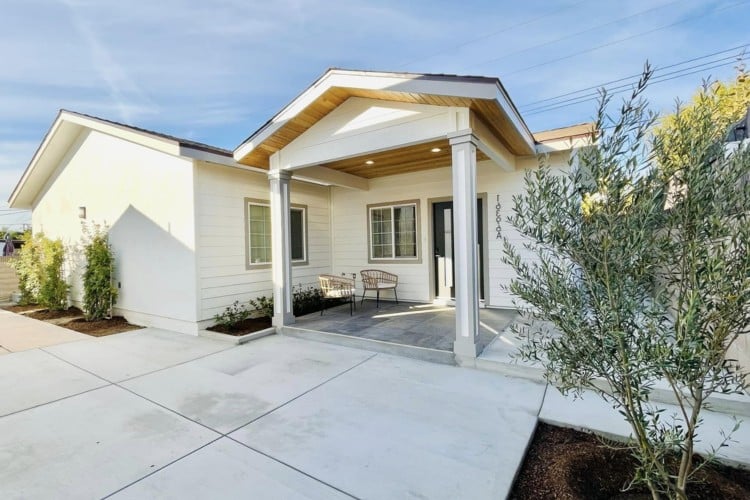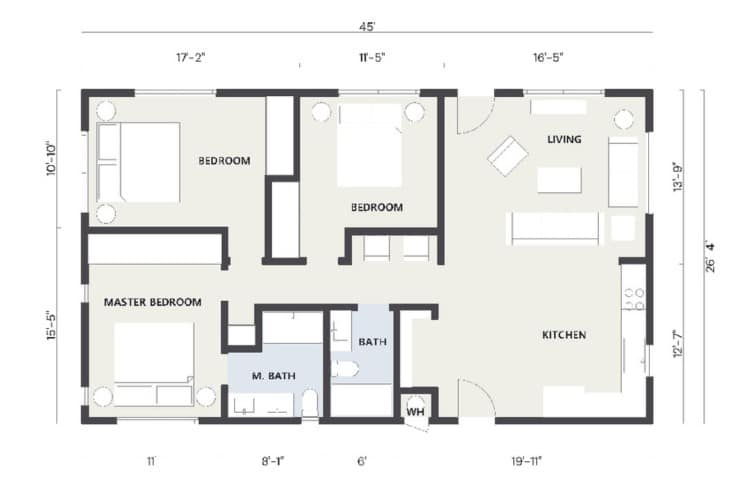Understanding California Assembly Bill 1033 (AB 1033): Homeowners Guide To The New Law and Selling Accessory Dwelling Units
32 min read

Introduction
Accessory Dwelling Units (ADUs) have gained popularity in California as versatile and valuable additions to residential properties. However, navigating the legal landscape surrounding ADUs can be complex. Recently, Assembly Bill 1033 (AB 1033) introduced significant changes that impact the creation and sale of ADUs in California. This guide will help you understand AB 1033, its implications for homeowners, and how it affects the real estate market.
What is the significance of AB 1033 for an ADU in the California real estate market?
AB 1033 has brought about important changes in the California real estate market, particularly concerning ADUs. This section will break down the bill’s key provisions and explain how they impact the sale and creation of ADUs.
Explaining the key provisions of the bill text in Assembly Bill 1033
AB 1033 is a specified law that introduces several pivotal changes designed to streamline the creation of accessory dwelling units in California. The bill text contains various provisions that impact homeowners, local governments, and the real estate industry.
Here are some of the most significant aspects of AB 1033:
- Separate Sale or Conveyance ADUs can now be sold or otherwise conveyed separate from the primary dwelling, providing homeowners with new monetization opportunities.
- Compliance with Local Ordinances AB 1033 mandates that the agency to allow an accessory dwelling unit to be sold separately through local ordinances.
- Utility Connections and Infrastructure ADUs must have independent utility connections, including separate meters for water, gas, and electricity.
- Planning and Zoning Law The bill’s provisions are declaratory of existing law, integrating with existing planning and zoning laws to streamline the approval process for dwelling units in areas zoned for residential use.
- Property Tax Implications Adding an ADU generally increases property taxes, but the primary residence is not reassessed. The property tax for the ADU is calculated based on its construction cost, typically ranging from 1-1.5% of the build cost. The bill provides clear guidelines for these assessments, ensuring compliance with existing law.
- Local Building Codes ADUs must comply with building codes and local ordinace to allow safety and structural integrity.
- Developed by a Qualified Nonprofit The bill would encourage the development of ADUs by qualified nonprofits to support affordable housing.
- Impact on Condominium Projects The bill outlines guidelines for creating and selling an ADU unit or units as condominiums.
- State Law Compliance The bill emphasizes the need for compliance with existing state laws related to housing and real estate.
How does AB 1033 impact selling an ADU?
AB 1033 addresses these key areas and provides a comprehensive framework for developing and selling ADUs in California. This legislative move will help homeowners capitalize on their property investments and local governments effectively manage the growing demand for ADUs.
AB 1033 opens up significant opportunities for selling ADUs by allowing them to be sold separately from the primary residence. This change provides homeowners with more flexibility and potential financial benefits. By selling ADUs as standalone properties, homeowners can tap into a new market of buyers looking for smaller, independent living spaces.
Here are some detailed aspects of how AB 1033 impacts the sale of ADUs:
- Increased Marketability ADUs can be sold separately, attracting buyers looking for affordable, independent living spaces.
- Flexibility for Homeowners Homeowners can sell ADUs without selling their primary residence.
- Financial Benefits Selling the unit and accessory dwelling unit separately can provide substantial financial returns and increase property value.
- Regulatory Clarity The bill mandates clear guidelines for selling ADUs, reducing uncertainty.
- Independent Financing ADUs with independent utility connections and legal descriptions are eligible for separate financing.
- Impact on Property Tax The bill provides guidelines for property tax assessments to sell an ADU separately in California.
- Encouragement for Development The ability to sell ADUs separately incentivizes homeowners to construct an ADU on their land.
- Local Government Support Local governments must adopt ordinances facilitating the separate sale of ADUs.
AB 1033 represents a significant legislative shift that enhances homeowners’ flexibility and financial potential with ADUs. By allowing the primary dwelling unit and accessory dwelling units to be sold separately, the bill creates new opportunities in the real estate market.
How does AB1033 in the state of California impact homeowners and local governments?
The new law brings several implications for homeowners and local governments in California. Understanding these implications is crucial for anyone navigating the ADU market effectively.
Understanding the implications for homeowners wanting to sell an ADU separately from the main property
Selling ADUs separate from the primary residence opens up new financial opportunities for homeowners. ADUs can now be treated as individual properties, which can be particularly advantageous in high-demand real estate markets. Here are some of the key implications:
- Financial Opportunities Homeowners can now sell ADUs as standalone properties, creating an additional revenue stream.
- Increased Property Value Selling ADUs separately can increase a property’s overall value, making it a more attractive investment.
- Market Expansion ADUs can be added to an existing single-family dwelling, appealing to a broader market, including first-time buyers, downsizers, and those looking for affordable housing options.
- Responsibility for Compliance Homeowners must ensure that their ADUs meet all necessary compliance requirements, including independent utility connections and adherence to local building codes.
- Documentation Requirements Notwithstanding any other law, proper documentation, including legal property descriptions and compliance with all local regulations, is essential for the separate sale of ADUs.
The role of local ordinances and State of California regulations in AB 1033
Local ordinances play a critical role in implementing AB 1033. AB 1033 authorizes a local agency to adopt regulations that align with state law to facilitate the separate sale of ADUs. This includes setting clear guidelines for permitting, construction, and sale processes.
Here are some key points:
- Alignment with State Law Local governments must adopt ordinances that comply with state regulations to ensure a uniform approach across jurisdictions.
- Clear Permitting Guidelines Setting clear guidelines for the permitting process helps reduce confusion and streamline the process to construct an ADU.
- Construction Standards Local regulations must ensure that ADUs meet all safety and building standards, providing a safe and habitable environment.
- Sale Process A local ordinance to allow the separate sale of ADUs ensures that homeowners and buyers understand the requirements and process involved.
- Support for Homeowners Local governments can provide resources and support to homeowners to help them navigate the new regulations and successfully sell their ADUs.
By understanding the implications of AB 1033 and ensuring compliance with both state and local regulations, homeowners can take full advantage of the opportunities presented by the new law. Local governments play a crucial role in facilitating this process, ensuring that the development and sale of ADUs are conducted smoothly and by all legal requirements.
What are the main considerations for selling ADUs under AB 1033?
Several key considerations must be considered when selling ADUs under the new law to ensure compliance and maximize benefits. Understanding these considerations is essential for homeowners to navigate the ADU market effectively.
Guidelines for separating the sale of ADUs from main residential properties
The sale of an accessory dwelling unit may be separate from the main residence and requires adherence to specific guidelines. This includes proper documentation, compliance with local building codes, and ensuring the ADU has its legal property description.
Here are the key points:
- Proper Documentation Ensure all necessary documents are in place, including legal property descriptions and titles for the ADU.
- Building Code Compliance The ADU must meet all local building codes to be eligible for a separate sale.
- Independent Utilities The ADU should have independent utility connections, including water, gas, and electricity meters.
- Zoning Requirements Ensure the ADU complies with local zoning laws and regulations.
- Financial Preparation: Ensure the ADU is independently financeable, which might require specific modifications or improvements.
Compliance requirements under the new law for ADU sales
Compliance is crucial for the successful sale of an ADU. Homeowners must ensure that their ADUs meet all local building and zoning requirements, including utilities, access, and safety.
Here are some compliance considerations:
- Utility Connections The ADU must have separate connections to ensure it can function independently.
- Safety Standards The ADU should adhere to all safety regulations, including fire safety and accessibility standards.
- Legal Permits Obtain all necessary permits and approvals from local authorities to ensure the ADU is legally recognized.
- Property Taxes Understand the tax implications of selling the ADU separately from the main residence.
- Independent Appraisals Get an independent appraisal of the ADU to establish its market value accurately.
Keep this in mind when wanting to sell an ADU in the city of San Diego
In San Diego, specific local regulations might affect the sale of ADUs. Homeowners should notify the local authorities to understand any additional requirements or restrictions that may apply.
Here are some key considerations:
- Local Regulations Check with the San Diego city planning office for additional regulations specific to ADU sales in the area.
- Professional Guidance Work with a real estate professional experienced in ADU sales to navigate the process smoothly.
- Market Demand Understand the local demand for ADUs to price and market your ADU effectively.
- HOA Rules Selling ADUs separately often requires the formation of a Homeowners Association (HOA) to manage shared spaces and enforce covenants, conditions, and restrictions (CC&Rs). This is crucial for properties not subject to an existing HOA’s governance, ensuring that shared responsibilities and costs are managed effectively.
- Neighborhood Impact Consider the impact of the ADU sale on your neighborhood and any community feedback that may arise.
By considering these considerations, homeowners can ensure they comply with AB 1033 and maximize the benefits of separate ADU sales. Proper preparation and adherence to guidelines will help streamline the sale process and achieve successful outcomes.
How does AB 1033 affect the real estate industry and the creation of ADUs?
AB 1033 impacts the real estate industry by influencing the creation and sale of Accessory Dwelling Units (ADUs). This section explores these effects and highlights the opportunities and challenges for real estate professionals.
The impact of AB 1033 on the development and sale of ADUs
The bill provides for the creation of ADUs by simplifying the regulatory framework and making it easier to sell them separately. This can increase the new construction of accessory dwelling units in areas, offering more housing options and potentially boosting property values.
Here are some key impacts:
- Streamlined Regulations AB 1033 reduces bureaucratic hurdles, making it easier for homeowners to obtain permits and approvals for ADU construction.
- Increased Housing Supply The bill facilitates the development and sale of ADUs, helping address housing shortages in California and providing more affordable housing options through many ADU constructions.
- Boost in Property Values Selling ADUs separately can increase the overall value of properties, making them more attractive to buyers and investors.
- Market Expansion The bill opens up new market opportunities for smaller, independent living spaces, appealing to first-time buyers, retirees, and those seeking affordable housing.
- Enhanced Flexibility Homeowners can participate in monetizing their properties by renting out ADUs or selling them as standalone units.
Opportunities and challenges for real estate agents in the ADU market post AB 1033
Real estate agents have new opportunities to market and sell ADUs as individual properties. However, they also face challenges in understanding and complying with the new regulations. Here are some of the opportunities and challenges:
Opportunities:
- New Market Segments AB 1033 creates new market segments for real estate agents to explore, including buyers looking for affordable, independent living spaces.
- Increased Listings Selling ADUs separately can increase property listings, providing more business opportunities for agents.
- Higher Commissions Given the increased property values, selling ADUs as standalone properties can result in higher agent commissions.
- Expertise Development Agents specializing in ADU sales can position themselves as experts in this niche market, attracting more clients seeking specialized knowledge.
- Market Diversification ADUs allow agents to diversify their portfolios and offer clients a wider range of property options.
Challenges:
- Regulatory Knowledge Agents must stay informed about the latest local ordinances and state laws to assist their clients in the sale of ADUs effectively.
- Compliance Requirements Ensuring that ADUs meet all compliance requirements can be complex, requiring agents to work closely with homeowners and local authorities.
- Market Education Agents may need to educate potential buyers and sellers about the benefits and requirements of ADU sales under AB 1033.
- Valuation Complexity Accurately valuing ADUs as standalone properties can be challenging, requiring a deep understanding of market trends and property assessments.
- Documentation and Legalities Agents must ensure that all necessary documentation is in place and that the ADUs comply with legal property description and zoning and are not in violation of state law.
Conclusion
AB 1033 represents a significant shift in the California real estate landscape, particularly for ADUs. By allowing the home and the ADU to be sold separately, the bill provides new financial opportunities for homeowners and creates a more flexible market for real estate professionals. However, navigating the regulatory requirements and ensuring compliance is essential for successful ADU sales.
Regardless of where you live in San Diego, whether it’s near La Jolla near the La Jolla Playhouse or Downtown Chula Vista, or beyond, we are here to help you. We’re the best ADU builders in San Diego, dedicated to making your next ADU project a success. Get started with us and schedule your free consultation today!
FAQs
AB 1033 is a California law that allows Accessory Dwelling Units (ADUs) to be sold or conveyed separately from the primary residence. This new law aims to streamline the creation and separate conveyance of ADUs, providing homeowners more flexibility and financial opportunities. By enabling the separate sale of ADUs, the bill text of AB 1033 helps address the state’s housing shortage by promoting the development of additional living spaces. This California Assembly bill 1033 also encourages local agencies to adopt less restrictive ordinances to facilitate ADU sales.
Yes, under AB 1033, you can sell your ADU separately from your primary residence. This provision allows homeowners to treat ADUs as individual properties, opening up new financial opportunities. However, it’s essential to ensure that your ADU meets all compliance requirements, including having independent utility connections and adhering to the California building code. Proper documentation and permits are also necessary to facilitate the separate sale. The passage of Assembly Bill 1033 by Assemblyman Phil Ting ensures that homeowners can sell an ADU separately while complying with state and local regulations.
AB 1038 is another California bill related to housing, but it focuses on different aspects than AB 1033. While AB 1033 deals with the separate conveyance and creation of ADUs, AB 1038 addresses other housing issues such as affordability and development incentives. It’s important to distinguish between these bills based on their specific provisions and impacts on the housing market. Unlike AB 1033, which aims to allow an accessory dwelling unit to be sold separately, AB 1038 covers different legislative priorities.
AB 2133 is another California bill addressing different housing and real estate issues. It’s not directly related to the provisions of AB 1033 but focuses on other aspects like environmental sustainability and housing density. Understanding the distinctions between these bills is crucial for navigating the complex landscape of California’s housing legislation. While AB 2133 covers different areas, AB 1033 represents a significant step in housing reform by allowing the separate sale of ADUs.
AB 1033’s main requirement is that ADUs can be sold separately from the primary residence. This means homeowners must ensure their ADUs comply with all legal and regulatory standards, including local zoning laws and building codes. Independent utility connections and proper documentation are also necessary to facilitate the separate sale of ADUs. This new law allows an accessory dwelling unit to be treated as a separate property, enhancing financial opportunities for homeowners.
The new law under AB 1033 allows for the separate sale of ADUs from the primary residence in California. This legislation provides clear guidelines for homeowners and real estate agents, making it easier to market and sell ADUs as standalone properties. Compliance with specified law or by ordinance ensures a smooth sale process. AB 1033 allows homeowners to benefit from the separate conveyance of the primary and accessory dwelling units.
The new laws include provisions for the separate sale of ADUs and other regulations to facilitate the development and sale of these units. These regulations help streamline the permitting process, ensure compliance with safety and building standards, and promote the creation of additional housing options to address California’s housing crisis. The approval of accessory dwelling units under AB 1033 helps local agencies adopt a local ordinance that allows for the separate conveyance of ADUs.
Under certain conditions, and if it includes an ADU, you might be able to sell part of your property separately. The ability to sell an ADU seperately from the main property provides homeowners with new financial opportunities. However, consulting with a real estate professional and local authorities is essential to understand all the legal and zoning requirements involved in such a transaction. The ordinance to allow the separate conveyance of ADUs facilitates these sales.
The value an ADU adds can vary based on location, quality of construction, and local market conditions. Generally, ADUs can increase property value around 20-30%, sometimes even more due to the added living space and potential rental income. The ability to sell ADUs separately under AB 1033 aims to enhance their marketability and overall property value further, making them a valuable investment for homeowners. The creation and separate conveyance of the primary dwelling from ADUs can provide substantial financial benefits.
Get more stories from us in your inbox.
https://betterplaceremodeling.com/resources/tips/ab-1033-adu/







